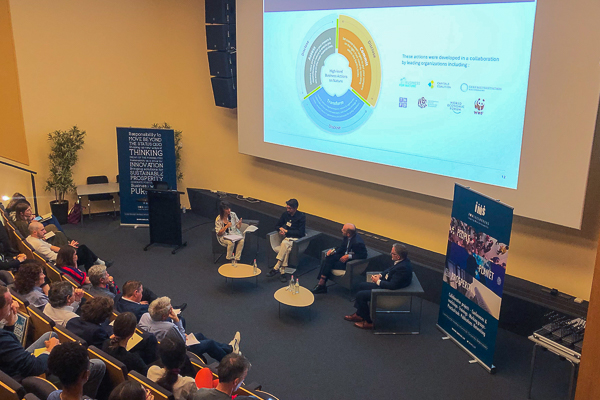 Credit: Ievgenii Karanov, Chronicle.lu
Credit: Ievgenii Karanov, Chronicle.lu
On Thursday 5 June 2025, local non-profit organisation Inspiring More Sustainability (IMS) organised the “Nature on Board” conference on integrating nature into business practices, held at Cercle Cité in Luxembourg-Ville.
Attended by around 70 participants, the conference highlighted the urgent need to rethink business activities in light of the global environmental crisis. With over half of the world’s GDP moderately or highly dependent on nature, the current state of ecosystems is considered catastrophic. Participants were urged to consider how integrating nature into corporate strategies can help secure a sustainable future for businesses.
In her opening speech, Nancy Thomas, IMS Luxembourg Director, highlighted the urgent need for businesses to integrate biodiversity into their core strategies. "This is not just an environmental issue - it’s an economic, social and survival one, and companies have the power to change the game," she stated. She also highlighted IMS’s ongoing work since 2020 on biodiversity with the support of the Ministry of the Environment, Climate and Biodiversity, as well as key partnerships at the national and international levels.
Milan Loreti, Project Manager at the Ministry of the Environment, Climate and Biodiversity, underlined the essential role of businesses in halting biodiversity loss. “Nature conservation is no longer the sole domain of public authorities or environmental NGOs as it requires a whole-of-society approach and that means companies must be part of the solution,” he said. He presented national strategies that support ecosystem restoration through practical tools, technical guidance and financial incentives, and invited companies to engage actively through concrete actions.
Pierre Schmitt, Environmental Officer for the City of Luxembourg, presented the city’s long-standing engagement in protecting urban biodiversity through monitoring, action and awareness. “Nature equals quality of life - not just for residents but also for everyone working in the city,” he said. He outlined initiatives including pesticide-free public areas, innovative forest monitoring, ecological park development and river restoration. The city also plans to plant over 30,000 new trees by 2030 and recently signed a convention with IMS to further promote nature in urban spaces through joint actions with local enterprises.
Before the roundtable began, attendees watched a teaser of Coexistencia – sur les traces des pumas by filmmaker Thomas Julienne, which explores the fragile coexistence between humans and pumas in South America.
Moderated by Hortense Serret, ecologist and biodiversity consultant at Nabi Ecology, the roundtable “Towards Nature-Positive Businesses” focused on how companies can take concrete steps to integrate nature into their strategies and operations.
Titus Ghyselinck, Programme Manager for Food & Agriculture at WWF Belgique, emphasised the urgency of systemic change: “Businesses must act now because of their impacts, dependencies, risks and opportunities related to biodiversity.” He outlined how companies can embed biodiversity through structured frameworks and disclosure-based action.
Offering a financial sector perspective, Jo Wuytack, Senior Sustainability Manager at Degroof Petercam, highlighted the challenges and necessity of data: “We see that 75% of corporate loan books are linked to biodiversity risks, so the pressure to act is real and growing.” He stressed the importance of collaboration, regulation and early engagement to manage long-term sustainability risks.
Bringing an educational lens, Phil Keech, Head of Sustainability at the International School of Luxembourg (ISL), shared a grassroots approach rooted in education and leadership: “To fix our broken relationship with nature, we must embed sustainability into the organisational structure and empower student leadership at every level.” He described how ISL integrates biodiversity and climate ambitions into its campus development and teaching through student-driven initiatives and strategic planning.
Before moving on to the final roundtable, Stéphane Van Haute, Climate Adaptation and Communications Lead at Friendship Luxembourg, presented a large-scale mangrove restoration project in Bangladesh as a successful example of climate resilience and community empowerment. “We started with climate adaptation, but biodiversity grew so fast that it became a new driver for local livelihoods and a strong narrative to engage private and public partners,” he said. The project has restored over 200 hectares of coastal forest and continues to expand through private sector support.
At the roundtable “Contribute to Restoring Nature,” moderated by Laetitia Mitchell, Project Manager for Biodiversity at IMS Luxembourg, speakers discussed the long-term commitment and funding needed for effective ecosystem restoration, and how companies can play an active role.
During the discussion, Catherine Meyer, Biologist and Ecologist at Hellef fir d’Natur Fondation, underscored the time-intensive nature of restoring ecosystems and the need for durable funding mechanisms: “Restoring ecosystems takes decades or even centuries, which is why long-term funding and land stewardship are essential.” She presented the foundation’s model of acquiring and managing protected land across Luxembourg and emphasised that public, private and philanthropic support are all crucial for success.
Marc Williem, Director of Projects at Graine de Vie Luxembourg, shared his experience working with local communities in Africa, where the NGO has planted over 65 million trees across eight countries: “We work hand in hand with communities because sustainability depends on people’s daily connection to the land.” He also addressed the growing importance of partnerships with companies as part of ESG strategies and highlighted the need to bridge the gap between field-based work and financial actors through shared expertise.
Axelle Ducos, Chief Growth Officer at Land Life Company, presented a technology- and science-driven approach to reforestation across degraded lands worldwide: “It’s time to move past carbon tunnel vision – restoring degraded land also means restoring ecosystems and biodiversity.” She explained how Landlife partners with companies on long-term nature-based projects that deliver both carbon and ecological value, particularly in biodiversity hotspots such as Indonesia, Mexico and Southern Europe.
The event concluded with an invitation from Nancy Thomas, Director of IMS Luxembourg, who encouraged participants to continue the conversation and take action within their organisations.








